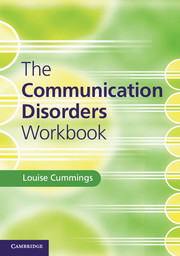Book contents
- Frontmatter
- Contents
- Preface
- Acknowledgements
- List of data analysis exercises
- Chapter 1 Introduction to communication disorders
- Chapter 2 Developmental speech disorders
- Chapter 3 Developmental language disorders
- Chapter 4 Communication disorders in mental illness
- Chapter 5 Acquired speech disorders
- Chapter 6 Acquired language disorders
- Chapter 7 Disorders of voice
- Chapter 8 Disorders of fluency
- Chapter 9 Hearing disorders
- Answers to questions and exercises
- Glossary
- References
- Index
- References
Chapter 5 - Acquired speech disorders
Published online by Cambridge University Press: 05 June 2014
- Frontmatter
- Contents
- Preface
- Acknowledgements
- List of data analysis exercises
- Chapter 1 Introduction to communication disorders
- Chapter 2 Developmental speech disorders
- Chapter 3 Developmental language disorders
- Chapter 4 Communication disorders in mental illness
- Chapter 5 Acquired speech disorders
- Chapter 6 Acquired language disorders
- Chapter 7 Disorders of voice
- Chapter 8 Disorders of fluency
- Chapter 9 Hearing disorders
- Answers to questions and exercises
- Glossary
- References
- Index
- References
Summary
Speech disorders can also have their onset in adulthood. Carcinomas of the oral cavity can often be advanced at the point of diagnosis and necessitate surgical removal of the tongue in either a partial or a complete glossectomy. Post-operative speech production can achieve acceptable levels of intelligibility. This is possible through the use of compensatory strategies, which are either naturally acquired or directly taught. These strategies permit the client who undergoes a glossectomy to produce articulatory contrasts in the absence of normal tongue structure and mobility. As with many clients with acquired speech disorders, the individual who has a glossectomy may also present with swallowing problems (dysphagia).
A range of neurological events and diseases can cause acquired dysarthria in adults. Most commonly, this speech disorder is the result of a cerebrovascular accident or stroke. However, several other conditions including infections (e.g. meningitis), traumatic brain injury, brain tumours, and neurodegenerative diseases (e.g. multiple sclerosis) may also give rise to dysarthria in adults. Depending on medical aetiology, acquired dysarthrias may improve, deteriorate or remain stable over time. For example, the adult who sustains a head trauma may be severely dysarthric or anarthric in the period immediately post-injury. But as spontaneous recovery occurs, there may also be improvement in speech function. However, in the client with a progressive neurodegenerative condition like motor neurone disease, speech production will deteriorate over a period of weeks or months as the client's neurological status worsens. These differing patterns of recovery and deterioration demand continual assessment of a client's speech production abilities and rapid adjustments in treatment.
- Type
- Chapter
- Information
- The Communication Disorders Workbook , pp. 72 - 87Publisher: Cambridge University PressPrint publication year: 2014



